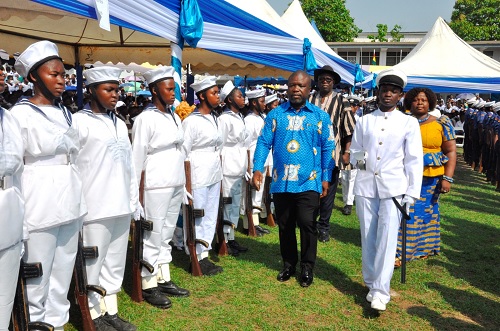The Volta Regional Minister, James Gunu, has said it is high time some notable girls’ senior high schools integrated entrepreneurial skills training, digital literacy and financial management into their curriculum.
“Beyond classroom knowledge, students should be exposed to mentorship, internship and startup incubation programmes to nurture the next generation of female business leaders,” he added.
Mr Gunu was speaking at the 71st speech and prize giving day of OLA Senior High School, Ho, on the campus last Saturday.
The Volta Regional Minister, who was a special guest at the event, stated that women-owned businesses were at the heart of economic transformation in Ghana.
He cited agribusiness, technology, fashion, finance, healthcare and digital innovation, as areas in which female entrepreneurs were creating jobs, solving problems and contributing to national growth.
Anniversary
The event, which coincided with the Silver Jubilee celebration of the 1999/2000 year-group of the school, was on the theme: Championing the cause of female entrepreneurs as catalyst for change and socio-economic growth.
Role, impact
In Ghana, Mr Gunu said women constituted about 44 per cent of all entrepreneurs, one of the highest rates in the world, and that was ample proof women were not just participants in the economy but also leaders and drivers of change.
Despite that progress many women faced barriers such as limited access to funding, mentorship and business training, Mr Gunu said.
That, he maintained, highlighted the need for deliberate and sustained efforts to ensure women were given the appropriate tools, support and opportunities they needed to thrive.
For instance, Mr Gunu said they needed better access to financial support, grants and investment opportunities to scale their industries.
“It is in that regard President Mahama came up with the women’s development bank initiative,” he said.
The regional minister gave an assurance that the government would continue to advocate policy reforms to promote gender equality in economic participation.
He paid glowing tribute to OLA Senior High School, Ho, for producing leaders, innovators and game-changers, saying many of the trailblazing women in business, academia, medicine and governance who were shaping the country today were products of the school.
Mr Gunu urged the students to study diligently towards a bright future, and congratulated the 1999/2000 year-group, the hosts of the celebration, for their dedication to contribute to the progress of their alma mater.
“The bond you share as Past OLA Girls’ Association (POGA) is powerful, and I encourage you to continue supporting, mentoring and empowering the young women who will walk in your footsteps,” said Mr Gunu.
Empowerment
The keynote speaker, an entrepreneur and a member of the 2000 year-group of Past OLA Girls’ Association (POGA), Lucy Afari, said investing in women entrepreneurs could have a transformative impact on local economies and communities.
“Women entrepreneurs are more likely to empower themselves economically, invest in education and healthcare for their families, create jobs and stimulate economic growth and develop innovative solutions to social and environmental problems,” she explained.
Mrs Afari said with just a little encouragement and support a woman could turn her business idea into reality, empowering herself and her family to achieve economic stability and prosperity.
The headmistress, Benedicta Amata Agbezudor, said the high standards of OLA Ho continued to attract Ghanaians and foreigners who wished their children and wards experienced the holistic secondary education the school was noted for.
She said the school now had an enrolment of 4,607, including 105 day students.
The headmistress touched on the challenges and said the school had two rickety 33-seater buses, and that their conditions were inimical to the image and administrative duties of the school.
Further, she said, the science laboratories needed a major renovation and refurbishment, and appealed to the government and philanthropic bodies to support the school in that direction to make teaching and learning more effective in the school.

